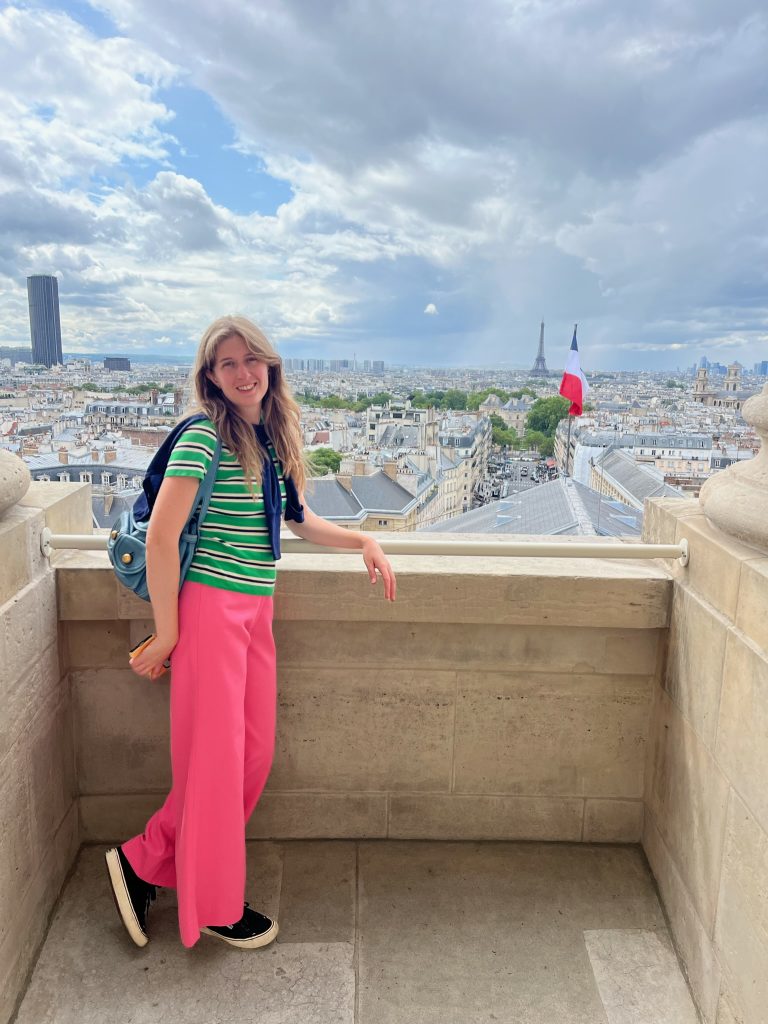How law school is uniting a love of French, teaching, and legal philosophy for this student
Earlier this summer, Viv Daniel was happily ensconced in the National Archives in Paris, France. As summer wanes, she is preparing to begin her J.D. at Maine Law. While on paper, it may look like Daniel performed a sudden about-face, attending law school is the culmination of a deep interest in the French language and the philosophy of law, the two passions that had her sifting through archival boxes last summer.
Her work in Paris was part of a one-year master’s program through New York University, which she enrolled in after receiving her BA in Government and Legal Studies at Bowdoin College.
“I’m a nerd for many things, but I’ve always been really interested in legal studies and French,” Daniel said. “I spent a summer in college volunteering as an English teacher with Portland Adult Education, where I met many francophone African students. I would have these long talks with them about the complicated immigration process their families were going through, and that’s when I realized how I could combine my two academic interests.”
Daniel felt drawn to Maine Law largely because of its Refugee and Human Rights Clinic (RHRC), which works to provide legal services to refugees and asylum seekers resettled in Maine, many from Francophone countries. “The fact that Maine Law is plugged into the immigrant rights scene in Portland and the state is huge for me,” Daniel said. “Beyond that, I wanted an environment that was communal, not competitive.”
Daniel, who received Maine Law’s Refugee and Human Rights Fellowship, also thinks her experience of teaching both in Portland and during her year abroad in France afforded her a distinctive skill set that will serve her well in law school.
“Lawyers act as translators to their clients for the law, which can feel like another language entirely. I think that the communication skills I have gained from teaching, coupled with the fact that I have always taught a foreign language, have really made me reflect on this aspect of the legal profession.”
Translation was a large part of the work Daniel engaged in during her summer in Paris and not only in the traditional sense. Daniel was involved in a multi-dimensional form of interpretation, examining how a specific foundation to France’s governing structure warped over time from a progressive ideology to one that became the bedrock of France’s notorious xenophobic laws.
Specifically, Daniel looked at the origins of France’s law separating church and state. In the early 20th century, the law was formulated to curb rampant antisemitism and outsized Catholic influence in the public sphere. Over a century, this law morphed into a tool to target Muslim communities in France and give legitimacy to rising xenophobia.
Daniel said this experience gave her a deep appreciation for the importance of examining the philosophy and history behind legal systems to understand both intent and context. Without that, she argues, systemic change is impossible.
It’s this kind of deep analytical thinking Daniel hopes to engage with at Maine Law, along with experiential learning through the Clinics at Maine Law and RHRC.
“I have so many different interests that I’m always finding unique ways to bridge them or integrate them,” Daniel said. “I see Law School as a means of finally bringing them all together.”

